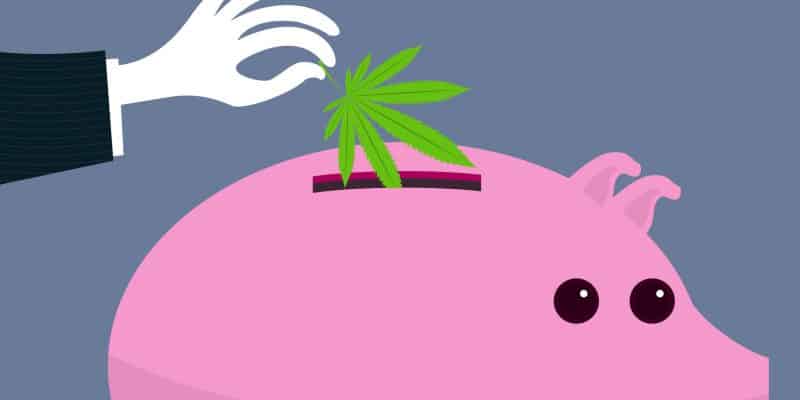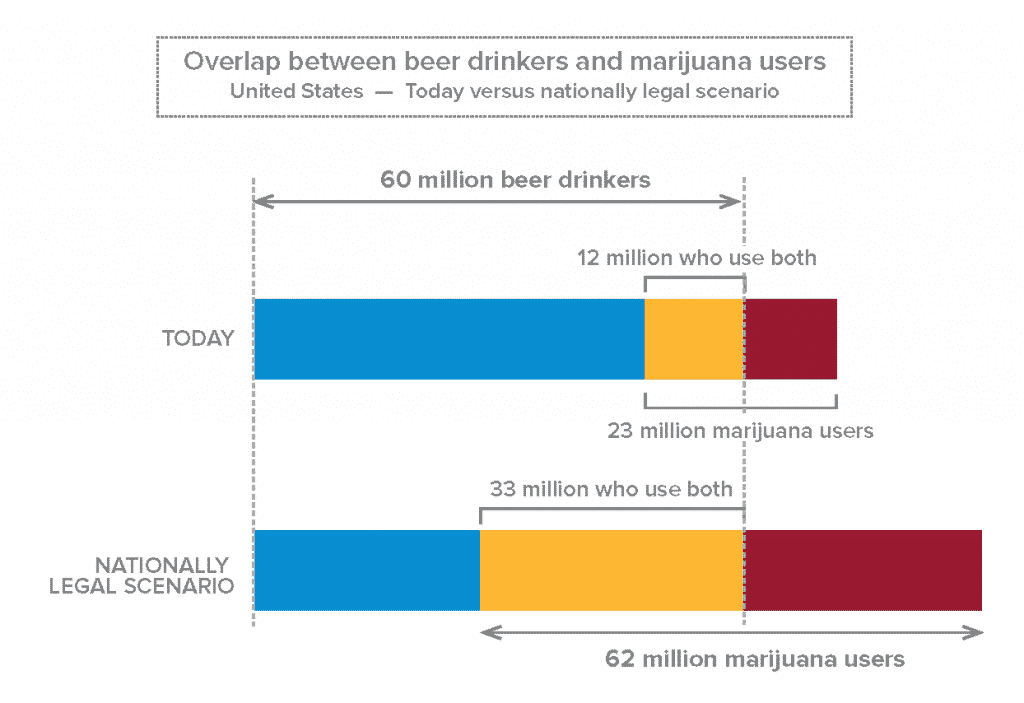Beer and weed don’t mix. Or do they?
Most adults who use both alcohol and cannabis report seldom using them on the same occasion[1], so in that sense the opening statement is more or less true. But in a marketing portfolio sense a lot of brewers are betting they’ll mix very well, and so the race is on to introduce cannabis-infused beers. [2]
Some prominent names have already ventured into this space, most notably Keith Villa, the former MillerCoors brewer renowned for his creation of Blue Moon in the 1990s. Now retired from MillerCoors, Villa and his wife Jodi have founded Ceria, Inc., to brew a line of THC-infused non-alcoholic beers[3] (it’s not currently legal for the same beverage to contain both alcohol and THC, the chemical responsible for most of the psychological effects of cannabis). And it’s probably not surprising that Heineken-owned Lagunitas, whose brand was associated through its founder Tony Magee with weed-friendly attitudes long before it was legal,[4] has introduced Hi-Fi Hops, a THC-infused, “IPA-inspired” sparkling water with hoppy flavor.[5] Molson Coors[6], Constellation Brands[7] and Anheuser-Busch InBev[8] are in the game as well, having announced joint ventures to brew and/or research cannabis-infused beers with Canadian cannabis companies Hexo, Canopy Growth and Tilray, respectively.
It seems that few doubt there’s a big opportunity here. Let’s break that opportunity down just a little.
By crunching numbers from multiple sources, we developed estimates on the size of a couple of key consumer segments for the U.S. market, shown in Figure 1.[9] As portrayed in the upper graph there are currently 60 million beer drinkers and 23 million marijuana users (legal and illegal) in the U.S., with about 12 million people using both. This means that about 20% of beer drinkers also use marijuana (THC’s most popular form) regularly.
But what happens once cannabis is legalized in all 50 states, as it almost inevitably will be? Surveys indicate that at least 27% of cannabis non-users would enter the market if legal barriers were removed[10] (some surveys find even higher percentages). This would result in 39 million new marijuana users, for a total of 62 million (see the lower graph in Figure 1). That’s right; it’s more than likely there would be more THC users than beer drinkers in the U.S. – and the percent of beer drinkers also using marijuana jumps from 20% to 55%. The latter figure assumes that new cannabis users will be just as likely as current users to drink beer – which is not necessarily true, but in the absence of any other data it’s a reasonable assumption.
In this framework there are two targeting options for a THC-infused beer. The most logical, and the easiest to target, is the 33 million-strong pool of people who use both beer and marijuana, and in fact the existence of this group is no doubt the primary reason brewers have rushed to develop THC-infused drinks. The great unanswered question, though, is how many current cannabis users will switch to a THC-infused beer just because they also happen to be beer drinkers? The motivations for doing so aren’t immediately clear (although we’ll come back to this question shortly).
But in the hypothetical absence of any widespread preference for THC in drinkable form, introducing THC-infused beers will mostly represent a defensive strategy for North America’s brewers – keeping drinkers in the fold who might otherwise switch to inhalable or ingestible THC on some occasions. True, at least at first there will be incremental gains for individual brewers because their new THC-drinking customers will be drawn from other brewers who don’t offer the option – which is why it’s likely most brewers will eventually develop their own THC-infused option, restoring the original equilibrium.
Playing defense is, of course, smart and necessary, but it’s not as satisfying as playing offense, seeking opportunities for growth rather than simply avoiding volume declines. In stands to reason that at least some brewers may turn their attention to the coming pool of 29 million marijuana users who don’t drink beer, in effect asking if at least some of them could become interested in drinking their THC rather than inhaling it.
However, if co-users of beer and cannabis are deemed unlikely to replace inhalable THC with the drinkable version, how likely is it that someone who doesn’t drink beer at all will be a prime target for THC-infused beer – especially since they already have good options in the form of inhalable or ingestible cannabis? On the surface the likelihood would seem to be approaching zero.
What all of these pessimistic arguments ignore is that the choices consumers make aren’t just about products. They’re about brands. Is it possible to build a THC-infused beer brand with attitudes and values that will resonate across categories, drawing marijuana users to drinkable THC for reasons that transcend the form in which it’s consumed?
Keith Villa seems to think so. And he has an interesting take on positioning THC-infused beer that really makes a pretty strong case.
Beer is more than water, hops, malt, and alcohol. Beer is also bonding, camaraderie, and community, an expression of solidarity and equality. Even the most independent-minded among us sometimes want to express those abstract group-oriented values through our choices. And the reality in our culture is that the feeling of community is strongest when everyone at the table is drinking beer.
In a press release last fall, Villa pointed out that craft beer (presumably more so than THC) is “democratic and socially acceptable.” He added that, thanks to Ceria’s beers, “The THC-infused non-alcoholic craft beer consumer can join the party without feeling ostracized.”[11]
Where hops and alcohol may not attract a cannabis user, the values that have defined beer culture for millennia just may. It may seem counter-intuitive, but the best way for THC-infused beer to attract cannabis users (whether or not they currently drink beer) may well be to treat it not as a subset of “THC-containing products” but rather as, ultimately, a beer, with all the rich meaning that implies. THC-infused beers could potentially open up their targeting to all 62 million marijuana users by leveraging beer’s cultural and emotional advantages.
And, of course, this is what successful brewers have always done.
[1] https://www.brewbound.com/news/beer-institute-examines-marijuana-industry-annual-meeting
[2] Cannabis can refer to products with either THC or CBD. The latter is considered more medicinal and does not produce a high. For this article we’ll focus on THC-infused beers, which is arguably likely to have a much more significant impact on the beer business.
[3] https://www.brewbound.com/news/blue-moon-creator-plans-release-line-thc-infused-non-alcoholic-beers
[4] http://marijuana.blogs.pressdemocrat.com/10674/lagunitas/
[5] https://www.highsnobiety.com/p/lagunitas-thc-sparkling-water/
[6] http://ir.molsoncoors.com/news/press-release-details/2018/Molson-Coors-Canada-and-HEXO-Announce-Agreement-to-Create-Joint-Venture-Focused-on-Non-Alcoholic-Cannabis-Infused-Beverages-for-the-Canadian-Market/default.aspx
[7] https://www.cbrands.com/news/articles/constellation-brands-5-billion-cad-4-billion-usd-investment-in-canopy-growth-closes-following-shareholder-and-canadian-government-approval
[8] https://www.ab-inbev.com/content/dam/abinbev/news-media/press-releases/12/Labatt_Tilray_Press%20Release_12.19.18_vfinal.pdf
[9] First Key Calculations using adult population data from the U.S. Census Bureau; incidence of marijuana use from the Center for Disease Control; beer incidence data from Kantar Futures’ Yankelovich MONITOR; and cannabis incidence, and overlap with beer, from BDS Analytics, as reported in https://www.brewbound.com/news/beer-institute-examines-marijuana-industry-annual-meeting
[10] https://www.washingtonpost.com/news/wonk/wp/2017/04/19/11-charts-that-show-marijuana-has-truly-gone-mainstream/?utm_term=.ccc323dd054a
[11] https://www.brewbound.com/news/blue-moon-creator-keith-villas-first-thc-infused-beer-is-a-belgian-style-white-ale




